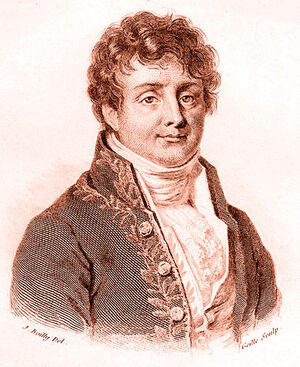Joseph Fourier (nonfiction): Difference between revisions
Jump to navigation
Jump to search
No edit summary |
No edit summary |
||
| Line 14: | Line 14: | ||
== Nonfiction cross-reference == | == Nonfiction cross-reference == | ||
* [[Dimensional analysis (nonfiction)]] - in engineering and science, dimensional analysis is the analysis of the relationships between different physical quantities by identifying their base quantities (such as length, mass, time, and electric charge) and units of measure (such as miles vs. kilometers, or pounds vs. kilograms) and tracking these dimensions as calculations or comparisons are performed. The concept of physical dimension was introduced by Fourier. | |||
* [[Fourier series (nonfiction)]] | * [[Fourier series (nonfiction)]] | ||
* [[Mathematician (nonfiction)]] | * [[Mathematician (nonfiction)]] | ||
Latest revision as of 14:55, 7 September 2019
Jean-Baptiste Joseph Fourier (/ˈfʊəriˌeɪ, -iər/; French: [fuʁje]; 21 March 1768 – 16 May 1830) was a French mathematician and physicist born in Auxerre and best known for initiating the investigation of Fourier series and their applications to problems of heat transfer and vibrations.
The Fourier transform and Fourier's law are also named in his honor.
Fourier is also generally credited with the discovery of the greenhouse effect.
In the News
Fiction cross-reference
Nonfiction cross-reference
- Dimensional analysis (nonfiction) - in engineering and science, dimensional analysis is the analysis of the relationships between different physical quantities by identifying their base quantities (such as length, mass, time, and electric charge) and units of measure (such as miles vs. kilometers, or pounds vs. kilograms) and tracking these dimensions as calculations or comparisons are performed. The concept of physical dimension was introduced by Fourier.
- Fourier series (nonfiction)
- Mathematician (nonfiction)
- Peter Gustav Lejeune Dirichlet (nonfiction)
- Physicist (nonfiction)
External links:
- Joseph Fourier @ Wikipedia
